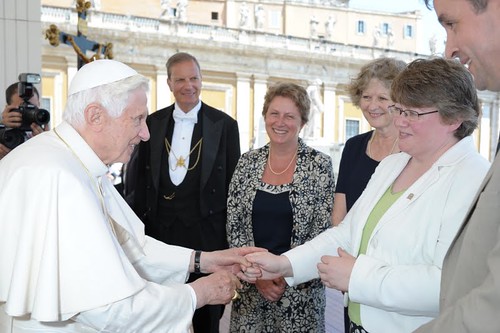30th May 2012
British Parliamentarians at Vatican

Seven members of the All-Party Parliamentary Group (APPG) for the Holy See have just visited the Vatican. In a whistle-stop tour, they were able to meet a range of important Holy See officials, including calls at the Secretariat of State and, separately, at Caritas Internationalis. They were also presented to Pope Benedict at the General Audience.
The APPG is an important instrument in the bilateral relationship between Britain and the Holy See. Formed in 2006, it is made up of Members of both Houses of Parliament interested in strengthening and developing contacts between the United Kingdom and the Holy See. Its strength is its all-party nature. Those on this trip came from the Conservative, Labour and Scottish National Parties, as well as one independent member of the House of Lords. They follow the work of the Embassy, and act as an unofficial pressure group in Parliament. They provide a window for the Holy See on current parliamentary debates, and a link between the Westminster Parliament and the Vatican.
One senior Vatican official told them that they were a model for Holy See relations with other parliaments. Recently, a Canadian Parliamentary Friends of the Holy See has been formed, and other parliaments – including some Italian deputies – have expressed interest in the idea. I can recommend it. They look at the big picture beyond today’s headlines (our talks over the two days covered issues from the Catholic Church in China to Caritas’s activities in Kenya, from ethical questions like the role of marriage to the difficulties faced by Christian minorities in the Middle East). And they provide a fresh perspective on what more the Embassy can do in its daily work with the Holy See.